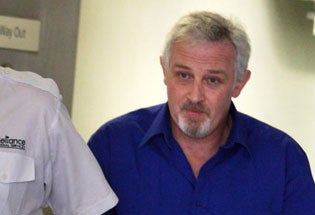Nat Fraser to wait for retrial decision

A man whose conviction for murdering his estranged wife was ruled unsafe will have to wait to learn if he will face a retrial.
Nat Fraser, 52, of Elgin, Moray, appeared at the Court of Appeal in Edinburgh two days after the UK's Supreme Court made the decision regarding his conviction in 2003.
Fraser was ordered to serve a minimum 25-year term after being found guilty by a jury in Scotland of killing his wife Arlene, whose body has never been found.
Today, after a brief hearing before three judges, he was remanded in custody and told the next hearing would be on June 8.
Fraser had appealed against his conviction, arguing at a hearing in March that Scottish prosecutors breached his right to a fair trial under the European Convention on Human Rights.
A panel of five Supreme Court justices in London unanimously agreed on Wednesday and said judges in Scotland must decide whether he should be tried again.
Scottish prosecutors have already said they would seek a retrial.
The court heard today that Fraser's defence team wants time to prepare for a possible retrial.
His defence counsel said: "It's only right that the defence has some opportunity to prepare for that."
The Lord Justice General, sitting with Lord Clarke and Lord Marnoch, granted the request to adjourn until June 8, and added: "The appellant will be remanded in custody."
Fraser, who sat still in the dock, was then led away by two guards, watched by members of Arlene's family.
Speaking outside the court, Arlene's sister, Carol Gillies, said: "Obviously we don't want to say too much, we don't want to jeopardise the case.
"It is a very difficult time for us just now, we feel as if we have been hit by a London bus to be perfectly honest.
"This has been an extremely difficult couple of days for us, obviously there is a huge amount of publicity.
"We are a very quiet family, we have been thrown into the limelight."
Mrs Fraser, 33, vanished from her home on April 28 1998.
The Supreme Court said part of the prosecution evidence was that her rings were found in the bathroom of her house on May 7 1998.
Prosecutors suggested Fraser had removed them from her body and placed them in the bathroom to make it appear that she had "decided to walk away".
But, the judges said, it later emerged that prosecutors had evidence from police to suggest the rings were in the house on the night Mrs Fraser vanished.
Fraser argued that the failure by the prosecution to disclose that information to his legal team had infringed his right to a fair trial under Article 6 of the European Convention of Human Rights.
"The court holds that the trial would have been significantly different if the undisclosed evidence had been available," said one judge, Lord Hope, in Wednesday's ruling.
"There's a real possibility that the evidence would have been sufficient to raise a reasonable doubt as to whether (Fraser) placed the rings in the bathroom on May 7.
"It that were so, the jury's verdict would have been bound, in view of the judge's direction, to have been different."
The court ruling also prompted a constitutional argument, with Scotland's First Minister, Alex Salmond, criticising the Supreme Court for "second guessing" the country's highest court.
